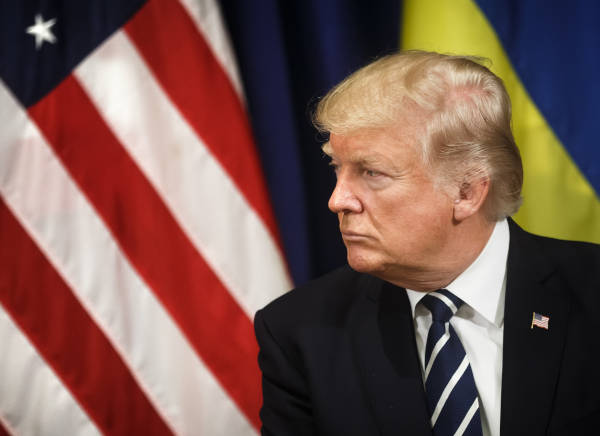Dear Mr. President
- Regulation
- February 18, 2019
- 7 minutes read

NEW YORK, USA – Sep 21, 2017: Meeting of the President of the United States Donald Trump with the President of Ukraine Petro Poroshenko in New York
Nineteen advocacy organizations ask the U.S. President to halt the FDA’s attack on vapor products.
By Timothy S. Donahue
It was necessary. On Feb. 4, a letter signed by representatives from 19 advocacy groups was sent to U.S. President Donald Trump urging him to immediately end the U.S. Food and Drug Administration’s (FDA) “aggressive regulatory assault” on the vapor industry.
“From inaction on pending product approvals to threatening letters sent to American manufacturers and promises to begin new rulemaking that would make illegal certain consumer products, this FDA is currently pursuing several policies that are more extreme than those contemplated by the Obama administration,” the letter reads. “FDA Commissioner Scott Gottlieb’s effort to curb the $6.6 billion electronic cigarette industry and an even larger reduced-risk tobacco alternatives market is inconsistent with your clearly articulated deregulatory objectives and will destroy jobs, limit consumer freedoms and harm public health.”
The signatories were: Grover Norquist, president of Americans for Tax Reform (ATR); Lisa Nelson, CEO of ALEC Action; Norm Singleton, president of the Campaign for Liberty; Tom Schatz, president of Citizens Against Government Waste; Michelle Minton, senior fellow for the Competitive Enterprise Institute; Jeff Stier, senior fellow for the Consumer Choice Center; Kenneth T. Cuccinelli II, director of Regulatory Action Center for FreedomWorks and former Attorney General of Virginia; Henry I. Miller, former director of the Office of Biotechnology at the FDA; Naomi Lopez Bauman, director of Healthcare Policy at the Goldwater Institute; Mario H. Lopez, president of the Hispanic Leadership Fund; Julie Gunlock, director of the Center for Progress and Innovation for the Independent Women’s Forum; Bob McClure, president and CEO of The James Madison Institute; Seton Motley, president of Less Government; Pete Sepp, president of the National Taxpayers Union; Douglas Kellogg, director of Ohioans for Tax Reform; Carrie L. Wade, director of Harm Reduction Policy at the R Street Institute; Paul Gessing, president of the Rio Grande Foundation; and Tim Andrews, executive director for the Taxpayers Protection Alliance.
The letter explains that vapor products do not contain tobacco and that they deliver nicotine without the combustion or tar that is found in traditional cigarettes. There are also numerous studies that have found that vapor products are at least 95 percent less harmful than combustible cigarettes. The letter also states that Gottlieb, the FDA Center for Tobacco Products’ director, Mitch Zeller, and Surgeon General Jerome Adams have acknowledged the harm reduction potential of e-cigarettes.
“Unfortunately, a spike in the use of these products by teens has resulted in regulatory panic and significant government overreach,” the letter reads. “Commissioner Gottlieb has already pressured major manufacturers of e-cigarettes to remove many products from convenience store shelves, suggested that more than 100,000 retailers limit adult access to these products and threatened to use agency power to remove thousands of legal products from the market. We do not write you today urging your administration to ignore the concerns about the use of e-cigarettes by teens. We do, however, urge your administration to subject the FDA’s response and actions to much closer scrutiny and examine it within the context of your broader deregulatory and pro-jobs agenda.”
When President Trump signed executive order 13771, “Reducing Regulation and Controlling Regulatory Costs,” he directed departments and agencies to not only eliminate at least two regulations for every new one created but to sensibly manage costs. The deregulatory efforts led to over $33 billion in savings through October 2018, according to the letter. Nearly every department and agency identified harmful regulations and worked to untangle and repeal them. One glaring exception has been the FDA.
“It’s important that we hold the president accountable for the promises he made in the 2016 campaign and initial days of his administration,” said Paul Blair, director of strategic initiatives for ATR. “Regardless of one’s politics, it’s clear that across every department and agency, the deregulatory agenda is being fully implemented. That’s just not happening at the FDA, and we want the president to know that conservatives are fed up.”
Blair goes on to say that vapers are passionate consumers, and, more importantly, they represent millions of voters, adding that they believe they’ve made a personal decision to improve their health. “There is a broad coalition in support of our efforts here; it’s not just [ATR’s] discontent at the FDA,” he says. “I want the president to understand that even though ATR has been out in front of this issue for years, we’re not alone in recognizing the importance of getting regulations for the tobacco and vapor industry right.”
It is likely that the impact of the FDA’s proposed, pending, and possible new guidance and rules for vapor products will amount to billions of dollars in lost economic activity and costs, according to the letter. Blair says it’s inexcusable. “At this point, a Hillary Clinton presidency would have been no different for the industry than Trump’s, all thanks to Scott Gottlieb’s misguided crusade.”
STUDY TIME
They keep coming. Another positive study concerning vaping has been completed. On. Jan. 30, the New
England Journal of Medicine published a predominantly U.K.-based study that finds that “e-cigarettes [are]
more effective for smoking cessation than nicotine-replacement therapy when both products [are] accompanied by behavioral support.”
For the study, scientists randomly assigned adults attending the U.K. National Health Service stop-smoking
services to either nicotine-replacement therapy (NRT) products of their choice, including product combinations, or an electronic nicotine-delivery system (ENDS) starter pack, with a recommendation to buy
their own flavors and strengths of e-liquids. The treatment plans also included weekly behavioral support for a
minimum of four weeks.
The researchers wanted test subjects to have sustained abstinence for one year, which was validated biochemically during the patient’s final visit. A total of 886 participants were involved. The one-year abstinence rate was 18 percent in the ENDS group, according to the study, as compared with 9.9 percent in the NRT group.
Among subjects with one-year abstinence, those in the ENDS group were more likely than those in the NRT group to use their assigned product at 52 weeks (80 percent [63 of 79 participants] vs. 9 percent [four of 44 participants]), according to the study. Overall, throat or mouth irritation was reported more frequently in the e-cigarette group (65.3 percent vs. 51.2 percent in the NRT group) and nausea more frequently in the nicotine-replacement group (37.9 percent vs. 31.3 percent in the e-cigarette group).
The researchers hail from Queen Mary University of London; King’s College London; London South Bank University, London; the University of York, York; Leicester City Council, Leicester; and the Roswell Park Comprehensive Cancer Center, Buffalo, NY, USA. –T.S.D.
